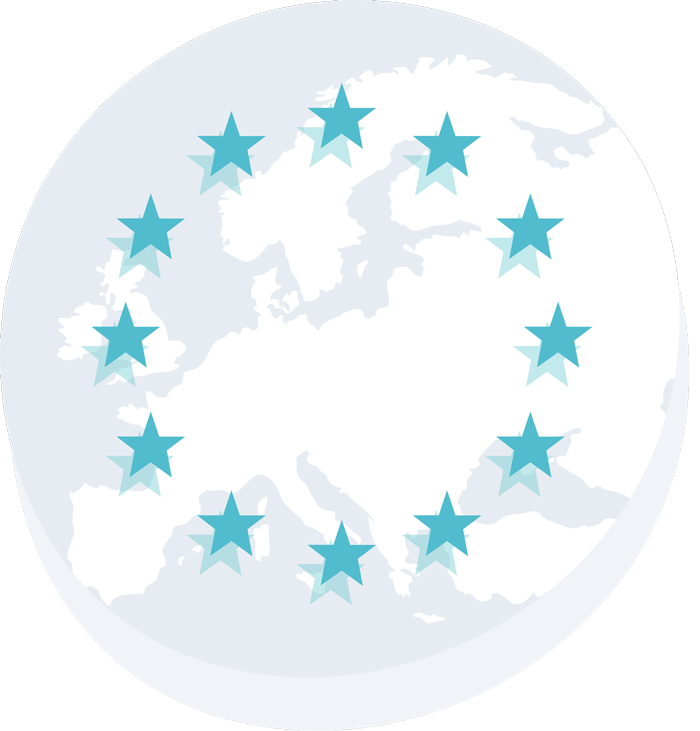What are EU priorities?
After every EU election, the newly formed European Commission, which is tasked with proposing EU laws, sets out top priorities for the duration of its mandate. These priorities form the basis of how the European Commission will organise its internal services (Directorates-General) who each will propose a set of initiatives on a yearly basis. These initiatives form the so-called “work programme” that sets out the decision-making agenda for any given year, resulting in new laws, revisions of past laws, communications setting-out future policies, or new funding opportunities from the EU budget. Check out the main priorities below to directly track some of the major initiatives that are currently being debated in Brussels.

A European Green deal
View the dashboard arrow_right
Climate change and environmental degradation are an existential threat to Europe and the world. To overcome these challenges, the European Green Deal seeks to transform the EU into a modern, resource-efficient and competitive economy articulated around 3 core principles: no net emissions of greenhouse gases by 2050, economic growth decoupled from resource use and no person or place left behind. This is the flagship priority of the current Commission and contains major hotly debated initiatives.
Green deal key initiatives
The "fitfor55" package forms the cornerstone of the European Green Deal. It contains a set of legislative proposals to prepare the EU's economy towards a 55% decrease in CO2 emissions before 2030. These initiatives target many aspects such as effort sharing, land use and forestry, renewable energy, energy efficiency, emission standards for new cars and vans and energy taxation. To mitigate the social impact of climate change policies a new Social Climate Fund is also foreseen.
View the "fitfor55" dashboard arrow_right
View the "fitfor55" dashboard arrow_right
To achieve environmentally and economically sustainable growth, the EU aims to move towards a "circular economy". This aims to reduce waste to a minimum as well as to promote re-using, repairing, refurbishing and recycling existing materials and products. This contains considerable challenges requiring a new set of rules on "waste management" and encouraging investments eco-design.
View the "circular economy" dashboard arrow_right
View the "circular economy" dashboard arrow_right

A Europe fit for the digital age
View the dashboard arrow_right
Digital technology is affecting every aspect of our daily lives. The EU is aiming to make this transformation work for businesses and citizens alike, while helping to achieve its target of a climate-neutral Europe by 2050. The core initiative of this priority is the "Digital decade": a strategy to set standards in data, push the European continent to take a leadership role in technology and develop its digital infrastructure. For example, significant resources from the EU budget will be devoted in the coming years to develop 5G, artificial intelligence and the general knowledge of the wider public.
“Europe fit for a digital Age” key initiatives
The digital decade is an agenda setting document (communication) designed to present a unified strategy for the EU to pursue in the next decade. Their key component is a so-called digital compass which seeks to achieve digitalisation of government services, improved skills within the wider public, development of cutting-edge technologies by companies. It aims to research and achieve world class digital infrastructure.
View the "Europe's digital decade" dashboard arrow_right
View the "Europe's digital decade" dashboard arrow_right
Online platforms have taken an ever-greater role in society and economy. However, rules that govern the behaviour of tech companies have not kept pace with the breakneck speed of digital innovation. The EU is seeking to rebalance this through two major new legislation: the digital services and digital markets acts. Together these laws seek to codify the rights and responsibilities between business and citizens and relations between business in the digital sphere. These are some of the most debated laws in Brussels.
View the "European Digital Services and digital markets acts" dashboard arrow_right
View the "European Digital Services and digital markets acts" dashboard arrow_right

An economy that works for people
View the dashboard arrow_right
Individuals and businesses in the EU can only thrive if the economy works for them. The EU’s unique social market economy aims to promote growth while reducing poverty and inequality. A key aim of this priority is to adapt and reinforce the vital role of small and medium businesses in the single market and put an end to loopholes in corporate taxation of multinational companies.
“An economy that works for people” key initiatives
Every EU country has some form of framework to set the minimum wages, either through negotiations with social partners or with a statutory hourly minimum. Discrepancies between EU countries and lack of protections within countries has led to a fragmentation of the labour force, leading to more in-work poverty and wage inequality. The Commission is proposing a framework for adequate minimum wages allowing for a decent living wherever you work in the Union.
View the "Adequate minimum wages in the European Union" dashboard arrow_right
View the "Adequate minimum wages in the European Union" dashboard arrow_right

A stronger Europe in the world
View the dashboard arrow_right
The EU champions multilateralism and a rules-based global order through a more active role and stronger voice in the world. Major issues, such as climate change and the global covid-19 pandemic, reinforce the need for a greater coordination between EU countries in foreign affairs. A key aim of this priority is to reinforce cooperation with our neighbours in Africa and the Western Balkans.
“A stronger Europe in the world” key initiatives
Multilateralism is facing serious challenges. Rising populism and authoritarianism undermine universal norms and drive a narrow focus on national interests. The current health crisis has shown that the UN system is not always up to the tasks it has been designed for. Commercial tensions between the US and China weaken the international commerce, leading to severe disruptions in supply chains across the world. To respond to these challenges, the EU is adopting a new strategy to reinforce international rules and reform global organisations to reflect the new complex realities of 21st century foreign affairs.
View the "Strengthening the EU’s contribution to rules-based multilateralism" dashboard arrow_right
View the "Strengthening the EU’s contribution to rules-based multilateralism" dashboard arrow_right

Promoting our European way of life
View the dashboard arrow_right
The EU is based on a set of core values of equality, tolerance and social fairness based on the rule of law. Threats from both inside and outside the Union are of core concern to the European Commission. Key initiatives under this priority, such as linking respect for the rule of law with EU funding and a common asylum policy, are some of the most complex discussions in Brussels.
“Promoting our European way of life” key initiatives
Respect for the rule of law is a core principle of membership to the European Union. Despite this obligation under EU treaties, some Member countries have significantly eroded their judicial system and democratic norms in the last decades. To combat this, the Commission is implementing a mechanism that links disbursement of billions of euros in EU funds to the respect to core principles. Do you think the EU should do more to protect democratic norms and values?
View the "Rule of law" dashboard arrow_right
View the "Rule of law" dashboard arrow_right
The COVID-19 pandemic has shown how important it is for EU countries to coordinate, both during the crisis and to improve preparedness and resilience for the future. The European Health Union is the first step in this policy area that has been historically handled at national level. One core aim is to leverage the combined clout of the 27 EU countries in their negotiations with the pharmaceutical sector.
View the "European Health Union" dashboard arrow_right
View the "European Health Union" dashboard arrow_right

A New Push for European Democracy
View the dashboard arrow_right
The EU is often perceived as being far removed from citizens, operating in its own Brussels bubble. Despite this fact, the European elections in 2019 saw the highest ever turnout, demonstrating a strong interest by voters to participate in EU affairs. This priority sets out avenues to improve citizens’ involvement, mainly by setting-up a Conference for the Future of Europe.
“A New Push for European Democracy” key initiatives
EU democracies are increasingly facing direct threats, in the form of disinformation from hostile actors, polarisation of the electorate and illegal funding of elections. The Commission is especially determined to bring more transparency in online political advertising and combat fake news wherever possible. It is also keen to enhance protections for journalists and foster impartial media, crucial to a healthy democratic debate.
View the "Transparency and democracy package" dashboard arrow_right
View the "Transparency and democracy package" dashboard arrow_right
Did you know?